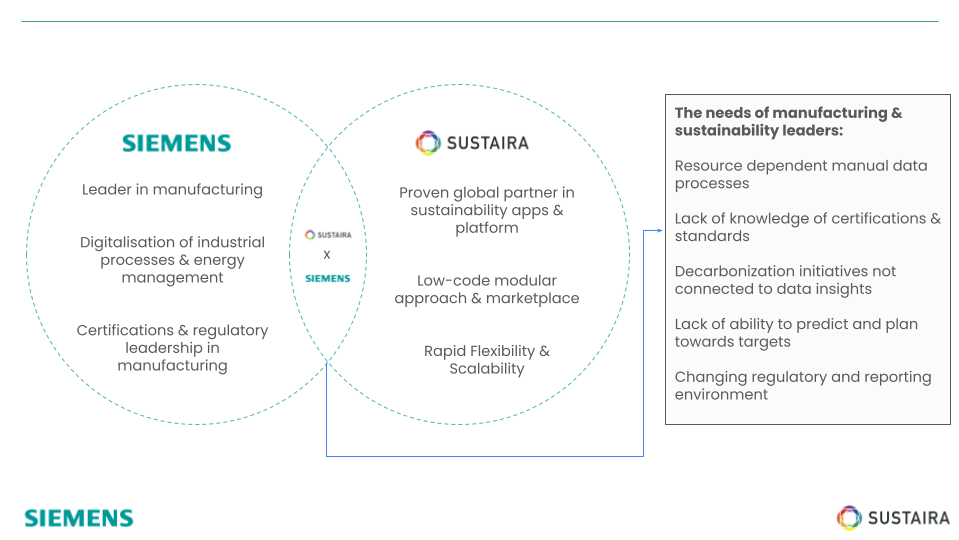How AI and Digital Ecosystems are transforming industrial sustainability
Industrial companies today are under immense pressure to become more sustainable. Customers demand environmentally responsible products, regulators impose stricter requirements, and internal stakeholders increasingly prioritize sustainability as a core business goal. Yet, implementing sustainability initiatives at scale is far from straightforward. Data is scattered across systems, expertise is concentrated in a small team, and operational decisions often happen in silos.
Fortunately, artificial intelligence (AI) and digital ecosystems are providing a new way forward. By connecting data, people, and processes across the organization and beyond, these technologies enable companies to make faster, smarter, and more measurable sustainability decisions.
See how Sustaira can help your company turn sustainability goals into action – Request a demo.
The Challenge of Industrial Sustainability
Industrial sustainability is inherently complex. Product environmental impacts are determined largely during the design phase, long before the product reaches the market. Yet engineers, production teams, and supply chain managers often lack the real-time insights needed to make environmentally optimized choices.
Data fragmentation compounds the challenge. Relevant information is spread across ERP and PLM systems, IoT sensors, supplier reports, and compliance databases. Extracting insights from this mix manually is slow and prone to error. Without connected systems and intelligent analysis, sustainability decisions are reactive rather than proactive.
Moreover, sustainability expertise is typically concentrated in a small group of specialists. While these experts can provide guidance, the scale and speed required for industrial operations mean that non-specialist teams must also be empowered to act with confidence.
Why Ecosystem Thinking Matters
To succeed at scale, industrial companies need to think in terms of ecosystems, not isolated departments. Internal collaboration between engineering, operations, and sustainability teams ensures that decisions consider multiple perspectives and impacts. External collaboration with suppliers, customers, and research partners amplifies the reach and effectiveness of sustainability initiatives.
Digital ecosystems play a central role in enabling this collaboration. Platforms like Siemens Accelerator illustrate how ecosystem thinking works in practice. They connect internal teams and external partners, providing a shared space for tracking KPIs, running simulations, and exchanging insights. By breaking down silos and connecting stakeholders, digital ecosystems transform scattered efforts into coordinated, impactful actions.
How AI and Ecosystems Drive Industrial Sustainability
Curious about the real-world impact of AI on sustainability and how leading companies are scaling their initiatives?
Our recent webinar, “Powering Sustainable Manufacturing: Strategies, Solutions & Real-World Insights with Siemens” explores actionable strategies, practical use cases, and lessons from industry leaders who are turning sustainability into measurable business value.
Missed the live session? Don’t worry — you can request the full webinar recording and see how AI and ecosystem-driven approaches can help your company achieve tangible sustainability results.
The Real-World Impact
Companies leveraging AI and digital ecosystems are already seeing significant results. Real-time KPI dashboards track carbon footprint, energy use, and material efficiency across business units. Collaborative platforms reduce emissions upstream in the supply chain while improving circularity. AI-driven design simulations identify material and process optimizations that lower environmental impact without compromising performance or cost.
These examples demonstrate that sustainability is no longer a trade-off. When supported by AI and connected ecosystems, industrial companies can achieve both environmental and business goals simultaneously.
AI and digital ecosystems are transforming industrial sustainability from a complex challenge into a scalable, strategic advantage. By connecting data, teams, and partners, companies can make smarter decisions faster, embed sustainability into everyday operations, and measure impact with precision.
The message is clear: sustainability at scale is possible but only when technology, collaboration, and expertise come together in a unified ecosystem.
If your company wants to achieve these results and turn sustainability into a measurable, strategic advantage, request a demo of Sustaira today and discover how our platform can help you track, optimize, and scale your sustainability initiatives across your organization.


